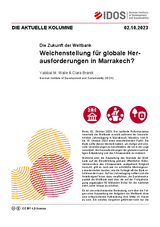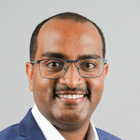Empowering Change at the Annual Meetings
The Ongoing Reform of the World Bank
Walle, Yabibal M. / Clara BrandiThe Current Column (2023)
Bonn: German Institute of Development and Sustainability (IDOS), The Current Column of 2 October 2023
Bonn, 2 October 2023. The ongoing reform process within the World Bank is reaching a pivotal juncture during the upcoming Annual Meetings in Marrakech, Morocco, from October 9 to 15, 2023. The Bank should seize this moment to adopt bold and meaningful changes that will enable it to meet the challenges of global development and climate change.
While there is a broad agreement on expanding the World Bank’s mandate to include the provision of global public goods, particularly climate change, there remains significant disagreement on how to increase the Bank’s firepower. During the Annual Meetings, shareholders must make a substantial commitment to increase the lending capacity of the World Bank far beyond the $50 billion over the next ten years that was committed during the Spring Meetings.
It is paramount to understand the consequences of expanding the World Bank’s mission without proportionately increasing its resources. Doing so not only jeopardises the Bank’s ability to achieve its goals in the face of the vast financial needs to achieve Sustainable Development Goals (SDGs) and address climate change but also forces unwelcome trade-offs. In particular, it could force the Bank to shift resources from poverty alleviation and shared prosperity to primarily addressing climate change, a concern raised by stakeholders from multiple regions during the consultations on the reform process. In addition, the Bank’s focus would inevitably tilt towards middle-income countries at the expense of their low-income counterparts. Thus, in order to deliver on the Development Committee's promise that the reform will not require such trade-offs, the Bank's financial strength must be substantially strengthened.
Recent moves, particularly by the United States and Germany, to increase the World Bank's lending capacity are highly commendable and should be matched by similar commitments from other major shareholders. US President Joe Biden's request to the US House of Representatives to approve an additional $25 billion in lending capacity over a decade is a significant step in the right direction. Although the timing and likelihood of approval by the Republican-majority House remain uncertain, such a gesture could dramatically increase the Bank's lending capacity, especially if it is followed by diplomatic efforts to encourage other shareholders to follow suit.
Germany's moves are also significant. Chancellor Olaf Scholz announced that his government would invest in so-called hybrid capital, unlocking up to $2 billion in additional lending capacity. While the amount is still small compared to the existing financing gap, the German government's move is a significant development as it is the first time a major shareholder has provided this type of financing to the World Bank. It is also a sign of the growing recognition of the importance of hybrid capital - a subordinated debt instrument with loss-absorption characteristics similar to equity, but without voting rights - as a way to mobilise additional resources for sustainable development. The German government can play a key role in this context by trying to convince other stakeholders to join in investing in hybrid capital.
Since existing efforts do not live up to the task, the Bank’s stakeholders should also step up efforts to implement further recommendations from the Capital Adequacy Framework (CAF) Review to increase the Bank’s firepower while preserving the Bank’s ‘triple A’ ratings, Preferred Creditor Treatment, and long-term financial sustainability. In particular, the development of options for enhanced callable capital holds significant promise. Callable capital is a commitment by the Bank’s shareholders to provide additional funding in extreme situations. By broadening the terms and seeking clarity from credit agencies and shareholders on the procedures and mechanisms for callable capital, there is tremendous potential to enable the bank to absorb more risk and expand lending.
World Bank President Ajay Banga recently indicated that a general capital increase by shareholders will not be on the table at the Annual Meetings. One reason for this reluctance may be that key stakeholders such as the United States and Germany want to see a more efficient institution before expanding its size, although this attitude appears to be changing as they have recently spearheaded efforts to strengthen the Bank's financial prowess. A capital increase is also inherently contentious, as it inevitably leads to discussions about the reallocation of voting rights. But one thing remains clear: size matters. A global bank, designed to meet monumental challenges of our time, operating on a paid-in capital of $22.6 billion over its 78-years history, is grossly undersised.
It is imperative for global leaders and stakeholders to recognise and act upon the pressing need for a robust World Bank, well-equipped both in mandate and in resources, to drive the change the world so desperately seeks.



